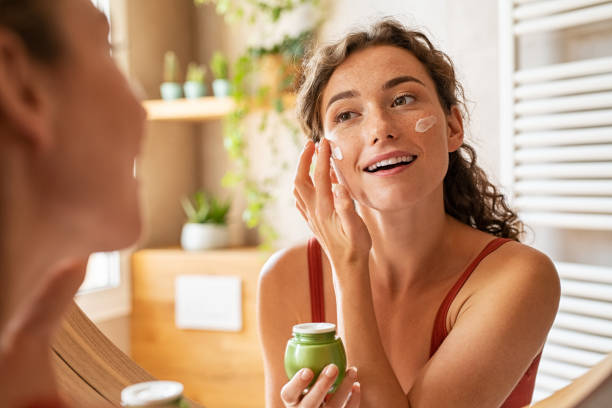
During the winter, our skin can become dry, flaky, and dull due to the cold air and lack of hydration. This happens when our skin loses its natural moisture. However, there are some home remedies that can keep your skin hydrated throughout the winter. You can try the following winter skincare tips:
Read Now: Wellhealthorganic.Com/Know-The-Causes-Of-White-Hair-And-Easy-Ways-To-Prevent-It-Naturally
Milk and honey mask:
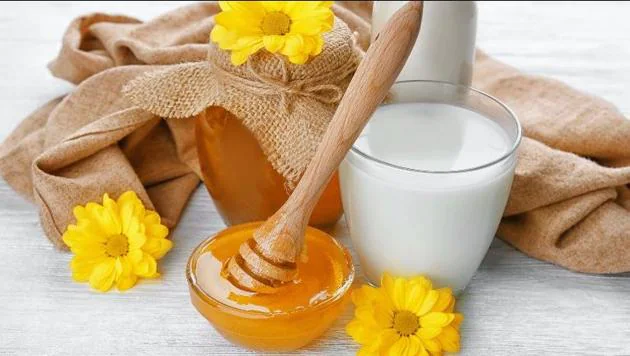
- Mix one tablespoon of honey with two teaspoons of milk to make a thick paste.
- Apply the paste to your face and leave it on for 20 minutes.
- Rinse it off with warm water.
- This mask will moisturize and nourish your skin, making it smooth and silky.
Read Also: Food to Eat for Healthy Skin
Avocado and honey mask:
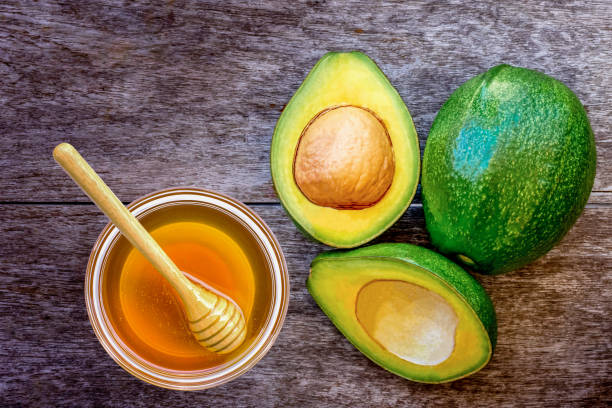
- Mash half an avocado and add one spoonful of honey.
- After 15 minutes, rinse it off with water.
- Apply this paste to your face.
- The vitamins and minerals in avocados will nourish and moisturize your skin.
Remember to drink enough water throughout the day to stay hydrated. These home remedies are just a few things you can do. Avoid using hot showers and strong soaps, as they can dry your skin and remove its natural oils. You can keep your skin hydrated and healthy all winter with extra care and attention. Learn more at wellhealthorganic.com:winter-skin-care-tips-home-remedies-to-keep-your-skin-moisturised.
Try these natural skincare remedies for the winter season:
Papaya, honey, and milk mask:
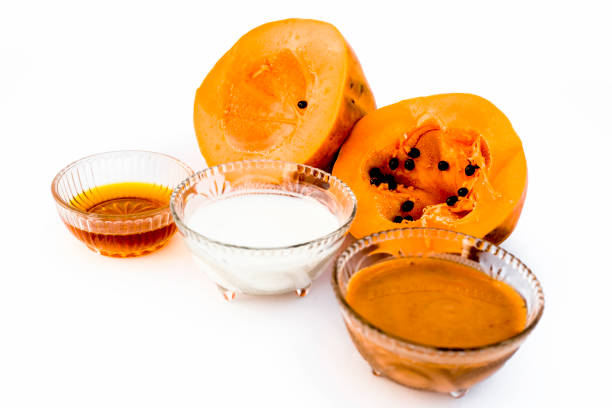
Papaya is a fruit rich in vitamins and minerals that benefit the skin. Using face masks made with papaya can help address skin issues and restore your complexion. This fruit provides nutritional elements that promote overall wellness and even aid digestion.
Honey is a moisturizing food with antibacterial and anti-inflammatory properties. It helps keep the skin smooth, silky, and supple. Milk contains lactic acid, which may assist in exfoliating the skin, although more research is needed in this area.
Here’s how to make and use the mask:
- Mix 1/3 cup of papaya with one teaspoon of milk and two tablespoons of honey.
- Apply the mixture to your face and neck.
- Leave it on for approximately fifteen minutes.
- Rinse it off afterwards.
- Use this mask once or twice a week for best results.
Papaya and banana face mask

Papaya is known for its skin-nourishing properties and is often used in face masks. It contains potassium, which helps moisturize the skin and prevent it from appearing dry or dull. The pulp of papaya also has a gentle exfoliating effect, gradually removing dead skin cells and revealing younger-looking skin. Additionally, it helps eliminate excess oil and dirt that can lead to acne and breakouts.
Here’s how to make and use the mask:
- Mash 1/3 cup of papaya and 1/3 cup of banana together.
- Apply the mixture to your face, neck, and chin.
- Leave it on for about fifteen minutes.
- Rinse it off afterwards.
- Use this mask several times a week for best results.
Honey and Yogurt Mix
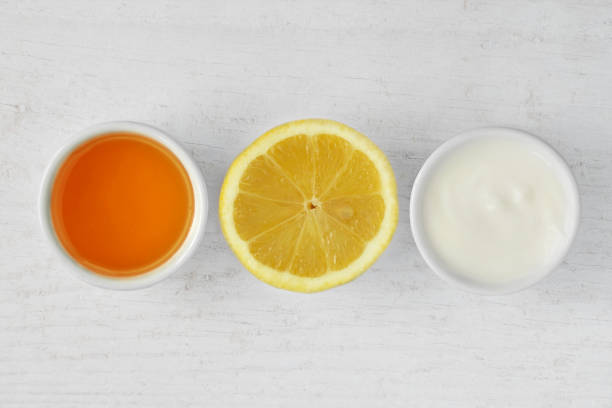
Yoghurt makes your skin more flexible and helps keep it moisturized by preventing water loss. Honey is well-known for its ability to keep your skin soft and moisturized. Honey also helps your skin look fresher and reduces the dullness that often happens in winter.
Here’s what you need to do:
- You’ll need three tablespoons of honey and three tablespoons of yoghurt.
- Mix them together well.
- Put the mixture on your face and neck.
- Wait for about fifteen minutes before washing it off.
Honey and cinnamon mask
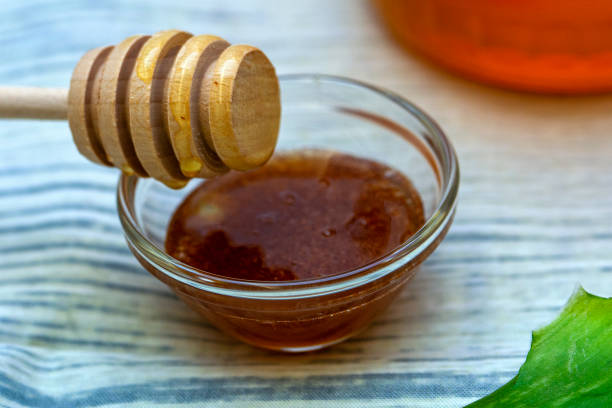
Both honey and cinnamon have benefits for your skin. Honey is a natural moisturizer, while cinnamon has antibacterial and antifungal properties that prevent dry skin. Cinnamon also helps remove impurities and improves blood circulation, while honey keeps the skin moisturized.
Here’s what you need to do:
- Mix three tablespoons of honey with one teaspoon of cinnamon powder.
- Apply the mixture to your face and neck.
- Leave it on for a few minutes.
- Rinse it off with water.
- Use this mask once or twice a week for best results.
What skincare items work best for dry, blemish-prone skin during the winter?
Here are some winter skincare tips and recommendations for dry, blemish-prone skin:
Gentle Cleanser:
Choose a gentle cleanser that does not contain sulfates, perfumes, or harsh chemicals. Look for moisturizing ingredients like hyaluronic acid or glycerin in the cleanser. This step is important to take care of your skin during the winter.
Exfoliation:
Use a mild chemical exfoliant such as salicylic acid or alpha-hydroxy acids (AHAs) once or twice weekly to remove dead skin cells and unclog pores. Avoid exfoliating too often, as it irritates the skin and worsens acne.
Moisturize:
Use a non-comedogenic, oil-free moisturizer to hydrate your skin without clogging the pores. Look for ceramides, hyaluronic acid, and niacinamide products to restore the skin’s barrier and reduce inflammation.
Sunscreen:
Protect your skin from harmful UV rays even during winter using a non-comedogenic, broad-spectrum sunscreen with an SPF of at least 30. Make sure the sunscreen is safe for acne-prone skin.
Read Also: Why Sun To Be Avoided For Skin Care
Spot treatments:
To address active breakouts, use over-the-counter acne medications that contain ingredients like salicylic acid, sulfur, or benzoyl peroxide.
Humidifier:
Using a humidifier in your home helps maintain moisture in the air, preventing your skin from drying out.
Avoid hot showers:
Hot showers can strip your skin of natural oils, leaving it dry and itchy. Opt for lukewarm water instead.
Stay hydrated:
Drinking enough water throughout the day helps keep your skin moisturized.
Consult a dermatologist:
If you’re struggling to control acne and dry skin despite using skincare products, seeking advice from a dermatologist and considering prescription treatments may be beneficial.
Remember that everyone’s skin is unique, so finding the proper routine and products for you may take some trial and error. For more information on winter skincare and DIY remedies for moisturized skin, you can visit wellhealthorganic.com.
Making Your Own Face Mask
If you don’t have access to medical-grade supplies, you can still make a simple DIY face mask. You only need a bandana or scarf, fabric, scissors, and a stapler. Cut the material into a rectangle covering your mouth and nose.
Fold the top and bottom corners of the rectangle inward to create pleats in the fabric. Secure the pleats in place with staples. Tie the mask behind your head for a snug fit. Remember to wash the mask after each use and replace it if necessary.
When to Seek Medical Help for Dry Skin
If your dry skin is accompanied by other symptoms like irritation, redness, or inflammation, it’s important to see a doctor. They may recommend using a prescription cream or ointment to relieve your symptoms. Suppose you suspect that an underlying medical condition such as eczema or psoriasis is causing your dry skin.
In that case, it’s best to consult a doctor right away. Visit wellhealthorganic.com for more information on winter skincare and tips to moisturise your skin.
Nighttime Winter Skincare Routine
Cleanse your skin with milk or a milk-based cleanser:
Milk is a wonderful cleanser that contains lactic acid, which helps remove dirt and makeup. Use a milk-based cleaner to thoroughly wash your face before bedtime. It will leave your skin feeling smooth and silky while keeping it hydrated during the winter.
Give your face a milk or flour rinse:
After cleansing, rinse your face with milk or a small amount of flour to further nourish your skin.
Exfoliate your skin every other day:
Exfoliation is important in the winter to remove dry, flaky skin. However, remember to exfoliate gently and only every other day. You can create a scrub by mixing ground coffee or oats with coconut oil or milk.
Massage your skin daily:
Remember to give your skin a daily massage, especially after exfoliating. This will deeply condition your skin and provide intense nourishment. Use oils like coconut, rosehip, or argan oil for the massage. If you prefer, you can also use aloe vera gel. After massaging, rinse your skin with warm water.
Choose a cream, gel, or moisturizer for deep conditioning:
Applying a high-quality moisturiser or lotion is one of the most crucial steps in your winter nighttime skincare routine. Opt for an ultra-hydrating moisturizer to keep your face, hands, and feet moisturized, soft, healed, and healthy.
Weekly Moisturizing Face Mask:
To speed up your skin’s rejuvenation process during winter, use a moisturizing face mask a few times a week. Here’s what you’ll need:
- Mashed bananas (make sure they are thoroughly mashed)
- Curd
- One tablespoon of honey
- A few drops of almond oil
Apply the mixture to your face once you have blended all the ingredients well. Afterwards, apply moisturizer. It’s best to use this method after giving your skin a massage. Following these five steps, you can maintain smooth, radiant skin even in harsh winters.
Start immediately incorporating this routine to keep your skin glowing throughout the winter. Remember to wash your face with lukewarm or cold water once the mask has dried.
Understanding the Importance of Taking Care of Your Skin in Winter:
When winter arrives, it brings along some challenges, especially for our skin. The cold weather can be tough, leaving our skin dry, itchy, and lacking moisture. That’s why taking care of our skin during winter is essential to have a healthy and vibrant complexion all season long.
Following a few simple steps and using natural remedies from our kitchen or garden, we can keep our skin moisturized and glowing, even when the chilly winds blow.
The Benefits of Home Remedies for Skin Moisturization:
While many skincare products are available in stores, there’s something special about turning to nature’s ingredients for our skin’s well-being. Home remedies offer numerous advantages that make them effective and enjoyable to use. Using natural ingredients found at home, we can tap into the power of gentle and nourishing elements that help moisturize and revitalize our skin.
Moreover, these remedies are often free from harsh chemicals, making them a safe and affordable choice for achieving a radiant complexion. Let’s explore the magic of home remedies and see how they can make our winter skincare routine a pleasant and fulfilling experience.
Understanding Why Winter Skin Care is Important:
Let’s explore why it’s crucial to understand the needs of our skin during winter, as explained on wellhealthorganic.com:winter-skin-care-tips-home-remedies-to-keep-your-skin-moisturised.
#1 Impact of Cold Weather on the Skin:
Our skin faces new challenges when winter arrives that can affect its health and appearance. The cold weather tends to remove the natural oils that keep our skin soft, leaving it dry, tight, and uncomfortable. Also, the low humidity in the air during winter worsens the problem by causing further moisture loss.
The combination of cold winds and indoor heating systems can also make our skin irritated, sensitive, and prone to redness. It’s important to understand these effects to adjust our skincare routine accordingly and provide our skin with the extra care it needs during this season.
#2 Common Skin Problems in Winter:
Winter brings with it various skin issues that require our attention and care. Dryness is a common problem, with the skin feeling rough, flaky, and dehydrated. Itchy skin can also be experienced, especially in areas prone to dryness, like the elbows, knees, and hands. Chapped lips are a familiar sight, causing discomfort and an unappealing look.
Some people may even face conditions like eczema or dermatitis flare-ups due to the harsh winter conditions. By recognizing these common skin problems in winter, we can take proactive steps to address and prevent them, ensuring a comfortable and radiant complexion.
#3 Factors that Make Dryness and Dehydration Worse:
While cold weather can make our skin dry, certain things can make it even drier and dehydrated during winter. Taking long, hot showers may feel nice, but they remove the natural oils from our skin, making it more prone to losing moisture. Harsh soaps and cleansers can also disturb the delicate balance of our skin, causing more dryness and irritation.
Indoor heating systems, although necessary for warmth, can dry out the air and make our skin even drier. Additionally, exposure to strong winds without proper protection can speed up moisture loss and make our skin feel even more dehydrated. By knowing about these factors that worsen dryness and dehydration, we can make mindful choices to minimize their impact and ensure our skin stays comfortably moisturized throughout winter.
Understanding the effects of cold weather, recognizing common winter skin problems, and being aware of the factors that worsen dryness and dehydration are important steps in creating an effective and personalized winter skincare routine. By addressing these aspects, we can promote healthier and happier skin seasonally.
Home Remedies for Keeping Your Skin Moisturized in Winter
Let’s find some home remedies for taking care of your skin during the winter by wellhealthorganic.com:winter-skin-care-tips-home-remedies-to-keep-your-skin-moisturised.
#1 Stay Hydrated
When it comes to caring for your skin in winter, it’s not just about what you put on the outside—it starts from the inside. Drinking enough water is essential for keeping your skin soft and moisturized during the cold months. Make sure to have refreshing glasses of water throughout the day to keep your skin hydrated from within.
You can also enjoy herbal teas and warm beverages like green tea or chamomile, which hydrate your body and provide antioxidants to protect your skin from the effects of the environment. Remember, when your body is well-hydrated, it shows on your skin with a healthy and glowing complexion.
#2 Nourishing Face Masks
Give your skin a special treat by pampering it with nourishing face masks that make you feel like you’re at a luxurious spa right in your home. Utilize the power of natural ingredients to moisturize and rejuvenate your skin. You can easily create your own face mask using simple items found in your kitchen, such as honey, avocado, yoghurt, or oatmeal.
These ingredients are packed with vitamins, antioxidants, and essential fatty acids that restore moisture and give your skin a radiant glow. Apply these masks once or twice a week, allowing your skin to soak up all the goodness and emerge feeling refreshed and deeply hydrated.
#3 Soothing Cleansing Routine
Taking care of your skin means being gentle and mindful, especially during winter. Cleansing is important, but choosing the right products and methods is crucial. Look for mild, moisturizing cleansers that remove dirt and impurities without removing your skin’s natural oils. Avoid harsh soaps and cleansers that can make your skin even drier and disrupt its protective layer.
When cleansing your face and body, use lukewarm water instead of hot water, as hot water can dry out your skin. Afterwards, gently pat your skin dry with a soft towel to help keep the moisture locked in. By following a soothing cleansing routine, you can keep your skin balanced and smooth all winter long.
By embracing the power of hydration from within, treating yourself to nourishing face masks, and practising a gentle cleansing routine, you can give your skin the care it deserves. These home remedies are effective and easy to use, so you can enjoy pampering yourself while benefiting from the goodness of natural ingredients. So, why not embark on a delightful self-care journey and let your skin enjoy the soothing embrace of these winter skin care remedies?
#4 Luxurious Treatments for Your Body
Give your body extra care and attention during the winter season with delightful moisturizing treatments. Natural oils such as coconut, almond, or jojoba oil can do wonders in hydrating and nourishing your skin. After a warm shower or bath, gently massage these oils onto your body when your skin is still slightly damp. This helps seal moisture and leaves your skin feeling incredibly soft and smooth.
To create a spa-like experience at home, you can make your own body butter and lotions using ingredients like shea butter, cocoa butter, and essential oils. These luxurious mixtures will cocoon your skin in a soft hug, making each day feel like a special pampering treat.
#5 Taking Care of Your Hands and Feet
During the winter, our hands and feet can suffer from harsh weather, causing dryness, cracks, and discomfort. It’s important to give them the care they need and protect them from the cold. Wear gloves and socks to create a shield and keep moisture locked in. And remember to pamper your hands and feet with soothing treatments.
Apply a nourishing hand cream or moisturizer multiple times daily, focusing on your knuckles and cuticles. Before bed, generously apply a thick foot cream and wear cosy socks to let the moisturizer deeply nourish and heal dry and cracked heels. By caring for your hands and feet and giving them extra love, you can keep them soft, smooth, and happy all winter.
#6 Caring for Your Lips: Say Goodbye to Dry Lips with Gentle Nurturing
When winter arrives, our lips can suffer from the cold, becoming dry, chapped, and uncomfortable. Give your lips some tender love and care with gentle yet effective lip care remedies. You can gently exfoliate your lips using homemade lip scrubs made from sugar, honey, or a combination of nourishing oils. This will remove dead skin cells and reveal smoother, softer lips.
After exfoliation, apply a moisturizing lip balm that contains ingredients like beeswax, shea butter, or coconut oil. This will create a protective barrier and lock in moisture. Remember to reapply lip balm regularly, especially before going outside. By consistently caring for your lips, you can keep them looking beautiful and irresistibly soft throughout winter.
#7 Adding Moisture to Indoor Air
When we use heaters indoors during winter, the air can dry and cause our skin to feel dry and dehydrated. We can use humidifiers to bring back moisture into the air to tackle this. Place humidifiers in important areas of your home, like your bedroom, where you spend a lot of time. Having the right amount of humidity can help prevent your skin from becoming too dry and keep it naturally hydrated.
You can also place bowls of water near heating sources to increase moisture in the surrounding area. Adding moisture to the indoor air creates a comforting environment for your skin, allowing it to stay healthy and moisturized throughout the winter.
By enjoying moisturizing treatments for your body, taking care of your hands and feet, looking after your lips, and adding moisture to your indoor air, you can make your winter skincare routine enjoyable and easy.
These practices will nourish your whole body, ensuring that your skin stays beautifully moisturized, soft, and healthy even in the harsh winter weather. So, embrace these caring rituals and let your skin enjoy the benefits of winter self-care.
More Winter Skin Care Tips
Here are some extra tips to make your winter skincare routine even better and get the best results:
Say No to Long, Hot Showers: While taking long, hot showers in winter might feel nice, they can remove the natural oils from your skin and make it even drier. Try taking shorter, warm showers to keep your skin moisturized.
Layer Up for Protection: Wear multiple layers of clothing to protect your skin from cold winds and low temperatures. Choose soft fabrics like cotton or silk for the first layer to avoid irritation.
Don’t Forget Sunscreen: It’s important to shield your skin from the sun’s harmful rays in winter. Apply sunscreen with an SPF of 30 or higher to any exposed skin, especially on sunny winter days or when you’re outdoors.
Eat Healthy and Take Care of Yourself: Take care of your skin from the inside by eating a balanced diet with lots of vitamins, minerals, and antioxidants. Include fruits, vegetables, nuts, and healthy fats to keep your skin healthy. Also, manage your stress and get enough sleep, which can contribute to overall well-being and make your skin look great.
By following these additional tips along with your winter skincare routine, you’ll give your skin the extra care it needs and enjoy healthy, glowing skin all winter long.
Conclusion
During winter, our skin may face some challenges. Still, with the right knowledge and a few simple changes, we can keep our skin moisturized and beautiful throughout the season. By trying out home remedies like hydrating ourselves from within, using nourishing face masks, being gentle when cleansing, and trying out moisturizing body treatments, we can use the power of nature to keep our skin soft and glowing.
Remember to protect your hands, feet, and lips from the harsh weather, and add moisture to your indoor air to keep your skin hydrated. For more tips and ideas about winter skin care, visit wellhealthorganic.com:winter-skin-care-tips-home-remedies-to-keep-your-skin-moisturised. This helpful website offers detailed information and useful insights to improve your winter skincare routine.
How many times should I clean my face during winter?
Using a mild and moisturising cleanser, it’s best to clean your face twice a day, once in the morning and once at night. Washing your face too often can remove natural oils and cause dryness and irritation.
Which moisturizer is suitable for dry and sensitive skin?
Look for a moisturizer that is not fragrant and is hypoallergenic. Ingredients like ceramides, hyaluronic acid, and glycerin help repair the skin’s protective barrier and keeping it moisturized.
How can I exfoliate my sensitive skin without causing irritation?
A: Opt for a gentle chemical exfoliant such as lactic acid or a mild AHA instead of physical exfoliants. Exfoliate once a week or adjust the frequency based on how your skin responds.
Are there any natural ways to treat dry and sensitive skin in winter?
You can try these natural remedies:
- Apply pure aloe vera gel, which has soothing and hydrating properties.
- Use a homemade oatmeal mask, as oats are known for their moisturizing and calming effects.
- Apply honey, a natural moisturiser with antimicrobial properties, as a mask or spot treatment.
How can I protect my sensitive skin from harsh winter winds?
A: Wear a scarf or other protective clothing to shield your face from cold winds. Remember to apply a gentle and hypoallergenic sunscreen, even on cloudy days, to protect your skin from harmful UV rays.
Should I change my skincare routine in winter?
Adjusting your skincare routine according to the seasons is a good idea. Use gentle and hydrating products during winter to combat dryness and protect your skin’s barrier.
Q: How can I keep my skin hydrated from the inside?
Drink plenty of water, eat a balanced diet with lots of fruits, vegetables, and healthy fats, and consider taking omega-3 supplements. These practices can help keep your skin hydrated and promote overall health. For more information, visit wellhealthorganic.com:winter-skin-care-tips-home-remedies-to-keep-your-skin-moisturised.








